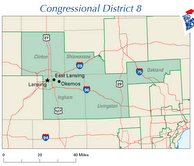For a little background on this bill...
Also referred to as the “say on pay” bill, it would require that public companies ensure that shareholders have an annual nonbinding advisory vote on their company’s executive compensation plans; and an additional nonbinding advisory vote if the company awards a new golden parachute package while simultaneously negotiating the purchase or sale of the company. H.R. 1257 has the support of many shareholder and workers rights groups, and investors, including the California State Teachers’ Retirement System and the International Corporate Governance Network.Seems pretty straightforward. The bill gives the shareholders of a company power to set the salary of a company's CEO.
Most working class Americans would agree that executive pay has gotten a little out of hand in recent years:
In 2006, the average CEO of a Standard & Poor's 500 company received $14.78 million in total compensation, according to a preliminary analysis by The Corporate Library.Somehow I doubt there are many folks living in the 8th district who are pulling down $14.78 million a year. However, I'm sure there are plenty of residents living in the 8th district who are counting on healthy growth in their 401(k) accounts to have a comfortable retirement.
Currently, boards of directors are responsible for setting CEO pay...
Too often, directors award compensation packages that go well beyond what is required to attract and retain executives and reward even poorly performing CEOs. These executive pay excesses come at the expense of shareholders as well as the company and its employees.This bill would've given power back to shareholders, but Mike Rogers sided with the wealthy CEOs, and voted AGAINST H.R. 1257.
Excessive CEO pay takes dollars out of the pockets of shareholders—including the retirement savings of America’s working families. Moreover, a poorly designed executive compensation package can reward decisions that are not in the long-term interests of a company, its shareholders and employees.
Mike Rogers says he works for you, but time and time again, he's shown us who he really works for.





3 comments:
I think the most important thing Roger's needs to do is to fire his slap-happy staffer. The 8th Ditrict will not tolerate this type of activity (from MIRS):
Rogers Staffer Arrest For Domestic Violence
Charles "Tony" BALTIMORE, the chief Lansing-based staffer for U.S. Rep. Mike ROGERS (R-Brighton), was arrested by Lansing police on Saturday and booked into Ingham County jail for misdemeanor domestic violence charges. He was released on bond.
Baltimore was arraigned in 54A District Court. He was not available to take media calls on Monday.
"Congressman Rogers takes these charges very seriously," read a statement from Rogers' office. "The office just learned of the allegations and is evaluating the situation carefully. Once all the information is available, appropriate action will be taken as warranted."
Yes, CEO pay has gotten out of hand. However, Congress has no business getting involved. It is extremely doubtful that the founding fathers envisioned this kind of overreaching regulation whne writing the commerce clause.
Well, Congress didn't vote to regulate CEO pay, they voted to give SHAREHOLDERS the right to regulate CEO pay.
Under this law, if the shareholders of a publicly-owned corporation are happy with the company's performance and feel the CEO receives a fair salary, then they wouldn't have to lift a finger.
If, however, the company's profits take a dive and the CEO still racks up a ridiculous paycheck, shareholders would have the power to regulate their salary.
Post a Comment